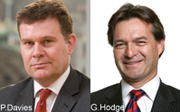Technology innovation comes in cycles. Every ten or 15 years a new wave of solutions appears and shakes up the status quo.
Fifteen years ago it was all about automating departmental workflows and eliminating paper trails. In the interim, systems have been built up gradually, adding complex functionality bit by bit. In many cases these are now all but exhausted and a radical change is needed in the way technology is viewed and deployed at an enterprise-wide level.
Fund accounting systems have been built by and for accountants, not operational business people. But by blending the accounting requirements with the operational problem, a very different solution would be created. There is a need to integrate the underlying fund accounting and transaction processing application with data management, reconciliation and business process management control – eliminating replication and driving efficiency.
There are real opportunities for firms to look at their technology as a way of driving end-to-end operational excellence, addressing business problems rather than focusing purely on improvements to general ledger, trial balance and reporting functionality.
A system built for operational excellence will deliver on three dimensions: efficiency, quality, and service capability.
In the funds processing world, a keymeasure of efficiency is the ratio of fund accountants to funds since labour represents 70-80% of a typical firm’s cost base. One option is to outsource or offshore; the technological alternative is to bring in innovative solutions to eliminate wasteful and inefficient processes from the accounting and associated business functions.
Quality is a measure of how far errors are eliminated from the process. Operational errors present the highest risk: if investors are making decisions about portfolios that are based on incorrect data, there will be direct economic and reputational costs.
Errors often occur because competition for investors’ funds has introduced huge complexities to systems and structures. The pressure of the daily production of valuations, calculations and reporting also increases the likelihood of errors being made. Although automation will improve the situation, improvementmay only beminimal if inputs are staged across multiple platforms.
Finally, there is service. Accuracy is paramount, but service is also about the timeliness of information given to the investor and other stakeholders. Anything that can be done to shorten the time between decision and action, execution and benefit will improve service quality.
However brilliant traditional fund accounting software is, it has served as a utility, not an excellence tool and to date it has not been doing its job to improve efficiency, quality or service.
To illustrate the point, we can examine the fund accounting pack. Traditional processes and systems create lengthy paper and printerintensive documents that are produced, checked, authorised, approved, discussed and archived daily. Eliminating the need for their production with technology immediately frees highly-skilled fund accountants frompaper-chasing and focuses them on added-value accounting functions.
Similarly, from an operational perspective, there are much better ways of supporting share classes than to add separate accounts within a balance sheet. The same is true of reporting, requesting data and the myriad processes that make up daily accounting procedures.
Re-engineering the process requires a rethink, but transparency, compliance and quality assurance can still be achieved without the paper and signature “by hand”.
In every organisation there is an intersection between product, accounting and operations. What these stakeholders really need is a platform that enables them to come together with their technology peers under a common vocabulary and approach to systems architecture that supports not just their own function and technology, but the business objectives at an enterprise-wide level. Implement a single, seamless platform that has at its core a fundamental, in-depth knowledge of the product domain and the processes surrounding it, and the result can be transformational, like the evolution of fund accounting itself.
Phil Davies is chief technology officer and Geoff Hodge is chief executive officer at Milestone Group ‘Fund accounting systems have been built by and for accountants, not operational business people’
©2011 funds europe





